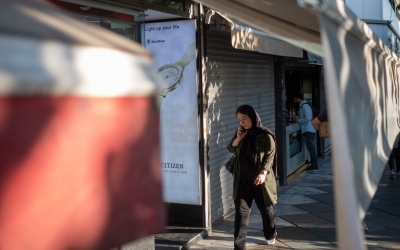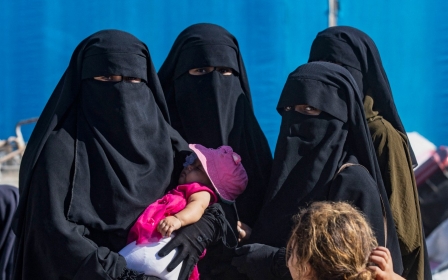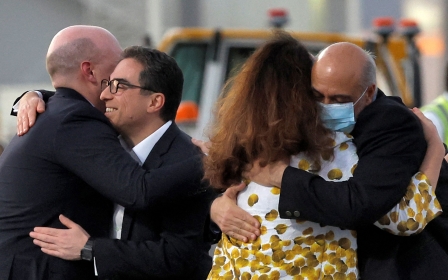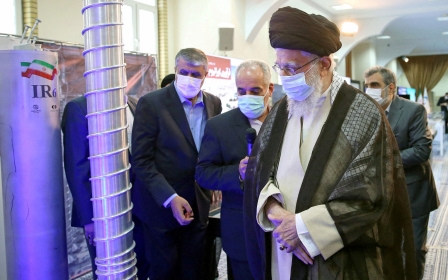Iraq says it removed Iranian Kurdish groups from eastern border
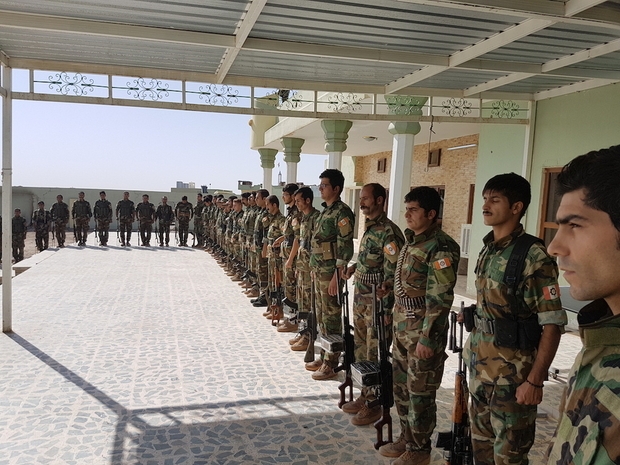
Iraqi authorities said they had successfully disarmed and removed a number of Iranian Kurdish groups from the border with Iran on Tuesday, as fears mounted over a possible military operation by their eastern neighbour.
Tehran signed an agreement with Baghdad in March to crack down on the armed groups, after it blamed them for stoking the protests against the death of Kurdish woman Mahsa Amini in Iran over the past year.
Under the deal, Iraq was required to disarm the groups - which are located in the autonomous Iraqi Kurdistan region - before 19 September, remove them from their bases and transfer them to distant camps.
Iranian foreign ministry spokesman Nasser Kanani said at the time that the 19 September deadline would "under no circumstances be extended", and added that Tehran would take matters into its own hands if their demands were not met.
A statement from the Iraqi High Committee for the Implementation of the Joint Security Agreement on Tuesday evening said they had successfully disarmed the groups on the Iranian border, without going into detail about which groups had been affected.
“The headquarters located near the border with Iran, which were previously used by Iranian opposition groups, have been definitively evacuated,” said the statement.
The statement said the groups had been moved to "a location far from the border", adding that "weapons were removed from these groups, as they are now considered refugees per the regulations of the Refugee Commission".
There are four Iranian Kurdish parties based in northern Iraq that have been the main thorns in Tehran's side: the Kurdistan Freedom Party (PAK); the Free Life Party of Kurdistan (PJAK), a group affiliated with the Kurdistan Workers Party (PKK); the left-wing Komala party; and the Democratic Party of Iranian Kurdistan (PDK-I), who are ideologically aligned with the ruling Kurdistan Democratic Party (KDP) in Iraqi Kurdistan.
Keywan Faramarzi, from Komala's Office of International Relations, told Middle East Eye that they were still moving their people. But despite the dismantling of their camps, the party would continue to operate in "mountains and houses" throughout Kurdistan.
"The Iranian regime has been threatening us for 40 years," he said.
'The Iranian regime has been threatening us for 40 years'
- Keywan Faramarzi, Komala
"Rocket attacks, support for espionage within our organisations, terror within our camps - a few years ago 20 kg of TNT was found in our camp."
He said the Islamic Republic was focusing on the Iranian Kurdish groups in order to distract from the real cause of the unrest in Iran.
"The target of Iran's latest attack is not the Komala party or Iranian Kurdistan - Iran wants to keep all the thoughts of Woman Life Freedom busy with something else so that people forget about revolution," he said, referring to the Kurdish phrase that has become the slogan of the Mahsa Amini protests in Iran.
It remains to be seen whether Iraq's announcement on Tuesday will satisfy Tehran's demands.
A senior official from the PDK-I told MEE earlier on Tuesday that they were still waiting to see what action Iran might take, adding that Iran had already carried out a number of sporadic attacks on their positions.
"Our enemy, the Iranian regime, is all the time and every day attacking us," said PDK-I deputy chief Amanj Zebaii.
"Near to the border now, the Iranian regime is in a standby situation."
Anger in Tehran
According to the Kurdish news site The Citadel, the KDP had already, earlier in the month, successfully persuaded the PDK-I and Komala to vacate their encampments in the Halgurd and Berbzin mountains.
A source in Iraq's autonomous Kurdistan Regional Government (KRG) told the news site that Tehran was also demanding the extradition of 22 senior leaders of the Kurdish groups.
The source added that while the KRG was unlikely to comply with these demands, Iran was threatening kidnapping operations to capture the wanted individuals.
Iran has repeatedly blamed Kurdish groups across the border in Iraq for stoking unrest in its own Kurdistan province.
Hundreds have been killed and tens of thousands arrested over the past year, as demonstrations rocked the country in response to the death of Mahsa Amini, who died in custody after being arrested in Tehran for wearing the hijab "inappropriately".
Amini, also known by the Kurdish name Jina, was originally from the Kurdish city of Saqqez and reportedly has a number of relatives who are members or supporters of Komala, something which the Islamic Republic has used to blame the organisation.
Shortly after the outbreak of protests in October 2022, Tehran launched a number of air strikes against Kurdish groups in Iraq.
Separately, three members of the KRG's anti-terrorism forces were killed on Monday in a drone strike that hit an air field near the city of Sulaymaniyah.
So far, the authorities have not revealed who they suspect to be behind the attack.
In a statement, Bafel Jalal Talabani, president of the Patriotic Union of Kurdistan (PUK) - one of the ruling parties in the KRG - called on Baghdad to help prevent violations of its territory.
"We urgently request for these violations to stop and we also call on the Iraqi government to fulfill its constitutional and national duty to protect Iraqi territory and airspace, including the Kurdistan region, and to no longer allow these violations to happen again," he said.
Talabani pleaded with friends and "all freedom fighters" to support Kurdish people in the fight against what he called "terrorist acts".
Middle East Eye propose une couverture et une analyse indépendantes et incomparables du Moyen-Orient, de l’Afrique du Nord et d’autres régions du monde. Pour en savoir plus sur la reprise de ce contenu et les frais qui s’appliquent, veuillez remplir ce formulaire [en anglais]. Pour en savoir plus sur MEE, cliquez ici [en anglais].


